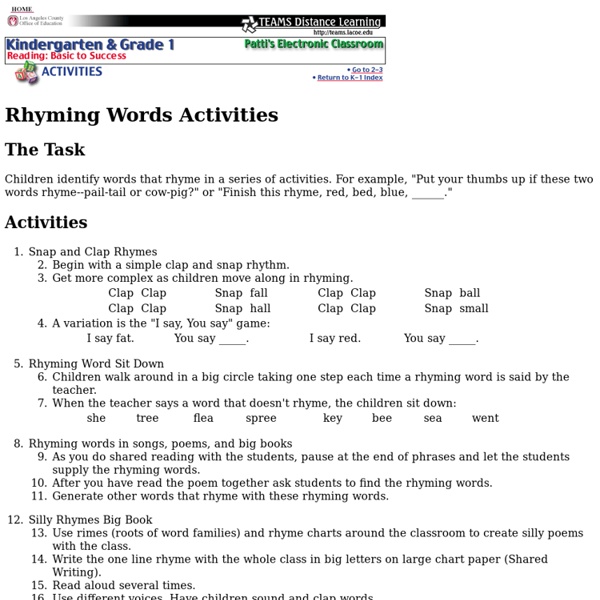



Isolating Beginning Sounds Phoneme IsolatingDirections: I will say some words. Listen to the beginning sound of each word. Tell me the first sound of the word. Model: Listen to this word: jumpI hear a /j/ sound at the beginning of jump. Share: Let us say the word together: hopWhat is the sound at the beginning of hop? Assess: Say each word after me and tell me the beginning sound.mousefishteethbatgoat Phoneme Matching Directions: I will say some words. Model: Listen to these words: keep, king, jump.Two of the words begin with the same sound; keep begins with the same sound as king /k/. Share: Let us say the words together. Assess: Listen to each group of words and tell me which two have the same beginning sound.
Phonemic Activities for the Preschool or Elementary Classroom This article features activities designed to stimulate the development of phonemic awareness in preschool and elementary school children. The activities originally appeared in the book Phonemic Awareness in Young Children: A Classroom Curriculum. Listening to sequences of sounds From chapter 3: Listening games Objective To develop the memory and attentional abilities for thinking about sequences of sounds and the language for discussing them. Materials needed Objects that make interesting, distinctive sounds. Activity In this game, the children are challenged first to identify single sounds and then to identify each one of a sequence of sounds. Once the children have caught on to the game, make two noises, one after the other. After the children have become quite good with pairs of noises, produce a series of more than two for them to identify and report in sequence. Variations With the children's eyes closed, make a series of sounds. Nonsense Book of familiar stories or poems Clapping names
Activity 1 Writeup How Now Brown Cow: Phoneme Awareness Activities Research indicates a strong relationship between early phoneme awareness and later reading success, and it links some reading failure to insufficiently developed phoneme awareness skills. Intervention research clearly demonstrates the benefits of explicitly teaching phoneme awareness skills. Many children at risk for reading failure are in general education classrooms where phoneme awareness training is not part of their reading program. This article presents a set of developmental phoneme awareness training activities that the special educator can integrate collaboratively into existing kindergarten and first-grade reading programs. Instructional considerations Before preparing to conduct phoneme awareness activities in a general education setting, the special educator needs to become familiar with the method being used to teach reading and should observe the class in action. Phoneme awareness activities work well in classrooms where teachers implement shared reading. Literature Figure 1.
ReadStrong - Phonological Awareness Phonological Awareness Why Phonological Awareness is Important for Struggling Readers Researchers have found that phonological awareness is strongly correlated with children’s success in beginning reading (Ehri & Nunes, 2002; National Reading Panel, 2000). Several longitudinal studies have found that early rhyming skills are highly correlated with later reading and spelling ability (e.g., Bradley & Bryant, 1983; Bryant et al, 1990, Maclean et al, 1987). One Thing to Keep in Mind: Research suggests that different readers may need different types and amounts of phonological awareness experiences. Teacher Resources Articles and Handouts " Phonemic awareness and the teaching of reading" Position statement by the International Reading Association "Developing phonemic awareness in young children" by Hallie Kay Yopp (1992). “Supporting phonemic awareness development in the classroom” by Hallie Kay Yopp and Ruth Helen Yopp (2002.)
Activity 2 Writeup Phonemic Awareness Notes Activity 3 Writeup Activity 4 Writeup
TEAMS Education Resources offers many phonemic awareness activities for students. They give many different activities that the teacher can utilize in the classroom. The activity and games they give are very interactive for students in the classroom. by jkor Jul 13
This site has great rhyming activities that promote phonemic awareness. by terria Jul 8
Useful for phonemic awareness activities, K-3. I haven't used it but it looks helpful. by janalyn Mar 9
Here I found engaging rhyming word activities designed for primarily Kindergarten and first grade. These activities include 'snap and clap' rhymes, a 'sit down' rhyming word game and silly rhyming poem ideas constructed by students from rimes (roots of word families). by jlehman Mar 9